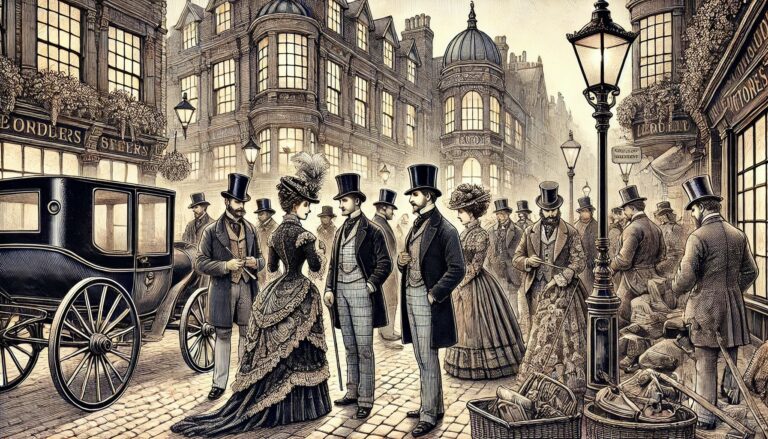Take a trip back to Britain’s golden age with these lovely Victorian words and phrases
—–
Some Victorian words…
Bricky
If someone in Victorian Britain referred to you as “bricky”, they were saying that you were brave or fearless.
“Yes, I remember her. She was a bricky young lady.”
Daddles
Say what? Your daddles are your hands.
“Hold up your daddles so I can see them!”
Gigglemug
A person who is always smiling or cheerful.
“What are you grinning at? You’re such a gigglemug.”
Jammy
When someone is “jammy”, it means that they are unfairly lucky or have come by good fortune by chance.
My grandpa used to tell me I was “jammy” if I’d been given a particularly good hand at cards or won by luck rather than by design. And it’s still making the rounds: you’ll still hear the odd Briton calling their friends a “jammy sod” or a “jammy bastard” when their bread lands butter side up in life.
The origins of “jammy” are likely to be the obvious: from jam, i.e. something delicious and good.
Mollisher
In Victorian Britain, a mollisher was the female companion of a villain, or thief.
Sound vaguely familiar? There’s a reason for that. Over time, this word was shortened to “moll”, which retained the meaning of a gangster’s girlfriend or a woman involved in the criminal underworld.
The root of both words likely comes from the older slang term “moll”, which itself derives from the name Mary, commonly used in the 17th century as a generic term for women of dubious reputation.
Nipperkin
In the same way that “snifter” can mean either a small amount of an alcoholic beverage or the vessel from which it is typically drunk, “nipperkin” is a vessel or container for liquor which holds no more than 1/8 pint (although there are differing views on how big a nipperkin can be). But it also came to mean the small drink which would be taken from such a vessel.
And it’s the name of a pretty posh-looking bar in London, too.
In fact, I could do with a nipperkin right now…
Penny dreadful
Penny dreadfuls were cheap, sensational novels about crime, adventure or violence which were mass produced in 19th century Britain.
Books cost far more than a penny these days, but I still like to lob this term at the work of certain writers which I consider particularly low quality. Colleen Hoover, for example.
Quockerwodger
This term originated in Britain in the mid-19th century and referred to a wood puppet which was operated by pulling its strings. Over time, it came to mean a politician or person in a position of influence who may have had the appearance of power but who was actually completely controlled and directed by someone else.
Quite useful today, I think. I’ll file it next to “snollygoster” in my collection of creative political insults.
And some Victorian phrases too…
Bang up to the elephant
Something done properly, perfectly; a top-notch performance. The “bang up” part probably comes from “a bang up job”, meaning a job very well done. Quite what the elephant part means is uncertain, but the size of an elephant was probably meant to underline the high quality of the work done. Originated in 1880s London.
(BTW: Congrats to the people in Denver who have called their vegan restaurant Bang Up To The Elephant. Excellent idea!)
Butter upon bacon
This means excessive luxury or extravagance—overdoing something that’s already indulgent. The idea is that both butter and bacon are rich foods, so adding one to the other is unnecessarily lavish.
“Installing a chandelier in the guest bathroom feels like butter upon bacon—completely over the top!”
To cop a mouse
A picturesque term meaning to get a black eye, for example, in a brawl. Probably because a black eye looks a bit like a mouse sitting on the injured party’s face!
To have the morbs
I often get the morbs, especially when it’s grey and cold outside or if work isn’t going very well. “Having the morbs” means to be temporary melancholy or down in the dumps.
Last shake o’ the bag
This must be my favourite phrase here: “the last shake o’ the bag” is a tender reference to the youngest child of a family.
Let’s hope those poor Victorian mothers weren’t literally shaken like a bag to see if there were any more children inside her, hiding in the corners…
Not up to dick
This might raise a few eyebrows if you say it today, owing to the word “dick” now commonly referring to male genitalia. However, back in Victorian times, not being “up to dick” was a perfectly harmless phrase meaning that you weren’t feeling very well.
Poked up
To be embarrassed, upset, or annoyed. It was often used to describe someone who felt put out or indignant about something.
“She was quite poked up about not being invited to the party.”
Send him to Coventry
To deliberately ostracise or ignore someone, usually as a form of punishment or social exclusion.
“After he betrayed the team’s trust, they sent him to Coventry and refused to speak to him.”
The phrase dates back to at least the 18th century, though the exact origin is unclear. And it doesn’t appear to be because Coventry was especially unpleasant. One theory is that it comes from the English Civil War when Royalist prisoners were supposedly sent to Coventry, where they were shunned by the largely Parliamentarian population.
—–
More articles for committed English language nerds!
Old-fashioned words and phrases in English
Extinct words in English that we need to bring back
Funny British sayings and their mysterious origins
You beetle-headed caitiff! A selection of old timey insults
53 British words for being drunk
—–
Image generated using ChatGPT
